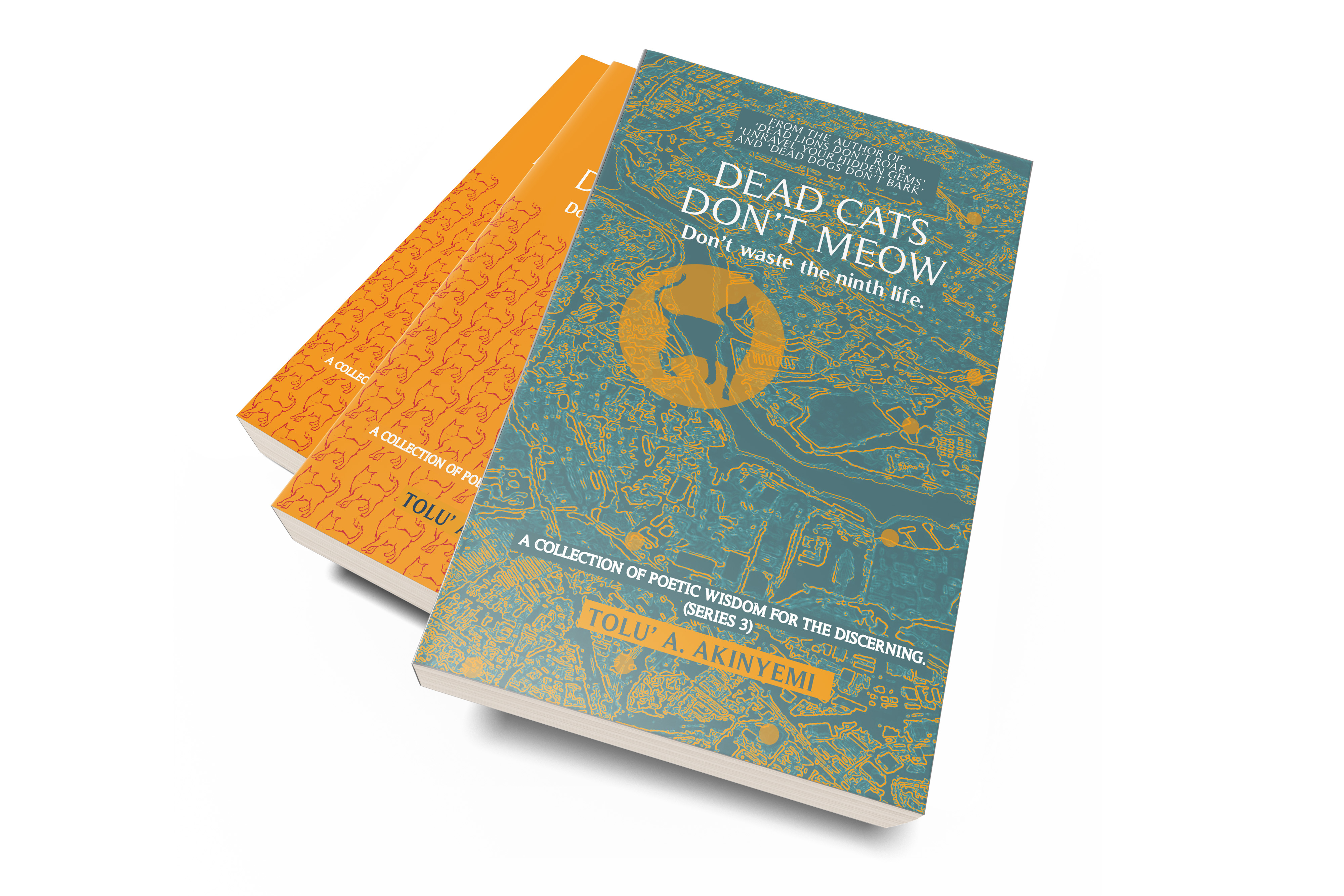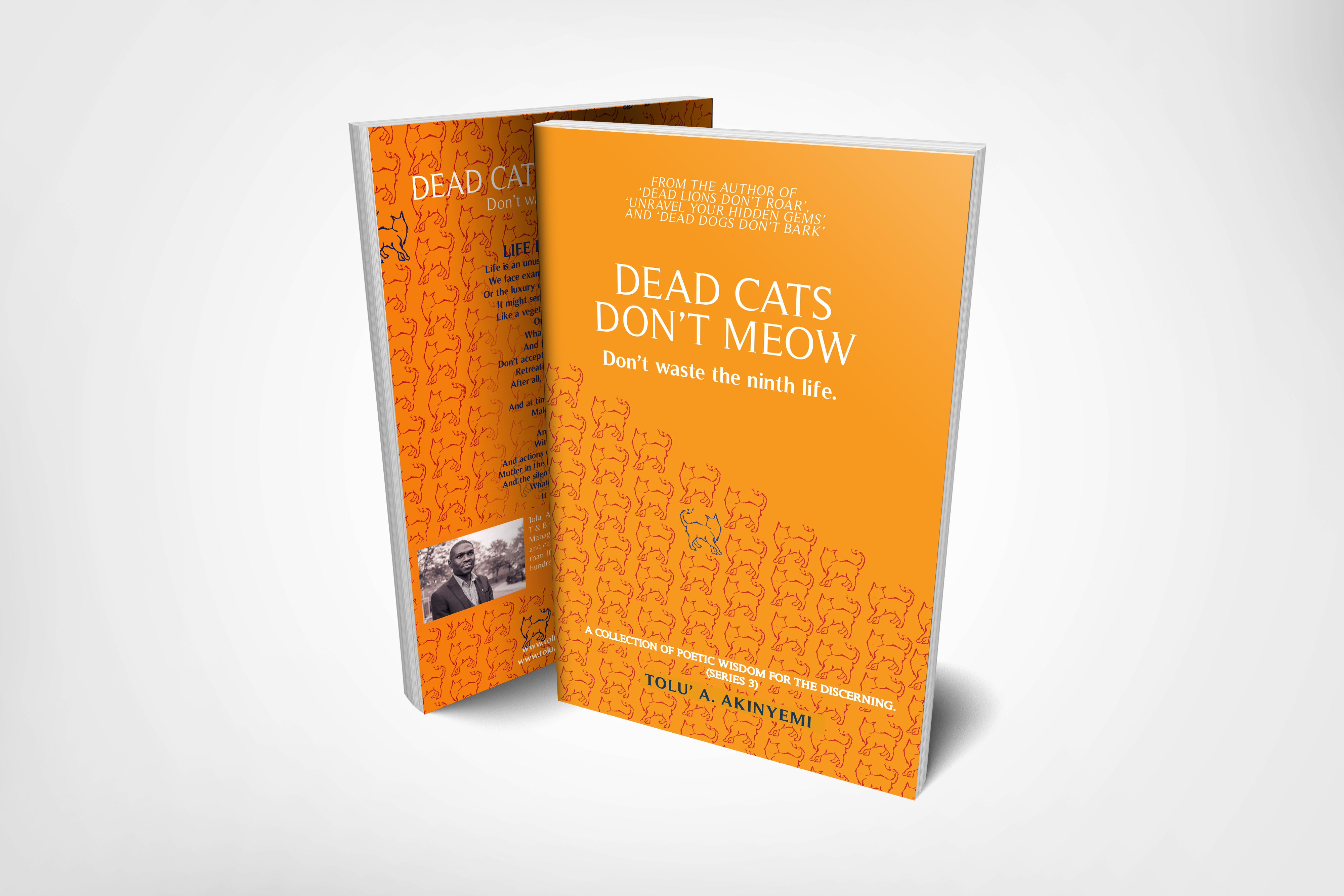Dead Cats Don’t Meow, Tolu’ Akinyemi, The Roaring Lion Newcastle Press, 2019, pp.128.
Reviewer: Faith Moyosore Agboola
WITH the current Nigerian literary waves dominated by grandiose display of poetry finesse, endless quests for literary appraisal and repetitive writing about our continent’s ills, Tolu Akinyemi has weaved his way to a stage of his own, writing poetry that doesn’t only appeal to the critical eye but also to the lost soul seeking direction.
Akinyemi writes poetry that doesn’t just appeal to the literary world but also to the regular human looking for some motivation to keep them going in this fast-paced world. He attests to this in his preface, stating that he aims for Dead Cats Don’t Meow to help you, the reader, “find your own voice in a world with a cacophony of voices”.
Akinyemi’s poems are simple and dreamlike, and would be sure to leave you “awing” like in the case of the poem, ‘My Story’ where he talks about his life journey with a future projection of a life well lived. ‘Fire’ has you thinking about your significant other, with a loving grin and ‘August Fourteen’ will leave you envious about his obvious respect and love for his wife.

However, he doesn’t only dwell on the positive side of love, as he explores negative themes and issues that undermine relationships. Poems that do this are ‘Abuse’, ‘Pangs of Adultery’, ‘Two in One’ and ‘Things We Say for Love’ among others. There are also lots of subtle elements of comedy as poems like ‘Don’t Call her Mummy’, ‘Children of Nowadays’, ‘Elections’ are clear winners in this regard, as they will cause you to giggle or smile at their content.
Akinyemi’s poems are also distinctly inspiring as they make the reader resort to analysing his or her life, and choices through either his written words of affirmation in the case of ‘King, ‘Today’, ‘Happiness’, ‘Yesterday’ or motivational charges to do more through the poems, ‘Dead Cats Don’t Meow’, ‘Passion’, ‘Everyday is a School Day’, and ‘Spoken Word’ or reflections on your weaknesses like in ‘Resolution’ and your strengths like in ‘Humanity’.
The poet also doesn’t shy away from giving constructive criticism, as he gives blunt counsel in poems like ‘Don’t Envy’, ‘Deadbeat Father’, ‘Rich in Cash Poor in People’, ‘Once Upon A Time’, ‘Culture’, and ‘Gossip’.
There are references to the literary space in poems like ‘An Ode to the Poet’, ‘Why I Read (1) and (2)’, ‘I am Booktiful’, ‘Realistic Poet’ and ‘Global Author’, which creatives and literary brands would find interesting and relatable.
Akinyemi also touches on political themes. ‘Change’ seems inspired by the acclamation of Nigerians for change. ‘Integrity’ is a reflection on our mistakes as a people. ‘Raped at Dawn’ and ‘Politrick-ians’ lament the ills of the elite leadership against the masses. ‘Brexit’ explores the disadvantages of the UK’s recent decision to leave the European Union, while ‘Nigeria’ explores the negative political journey of Africa’s giant and ‘Twenty Fifteen’ explores the clamour for division of Nigeria.

There are also references to peculiar places, issues and themes relatable to the poet’s home country, Nigeria. Some include the below par customer service culture in ‘Customer Unserviced’, the tech hub serving thousands of Nigerians – ‘Computer Village’, the late doctor, ‘Ameyo Stella Adadevoh’, who saved the country during the ‘Ebola Crises’, major bus parks such as ‘Oshodi’ and ‘Ojota’, and the notorious ‘Lagos Traffic’. All these will give non-Nigerians an interesting glimpse into the culture and way of life of his country of birth.
Akinyemi shares a lot of personal experiences with poems like ‘South Shields’, ‘A Blue in Geordie Land’, ‘Survivor’, ‘Roccagorga’, and ‘Thirty-Five Thousand Feet’, some of which follow the same trend of teaching vital lessons on life. Also, there are poems that tell macro stories. ‘Humility’, ‘Heaven’ and ‘The Randy Man’ narrate stories that are interesting and exciting yet pass messages that will leave the reader pondering.
The author closes the book with ‘My Words’, a poem that reveals to his reader that despite how real his poems feel, they are mainly fictional and shouldn’t be misconstrued.
Overall, Dead Cats Don’t Meow comes across as a collection of thoughtful poetry that inspires, entertains and educates its reader. It is a great blend of themes spanning across love, inspiration, politics, entrepreneurship, marriage and life among others. Its simplicity eludes intentionality and the play on words shows experience.
The collection is suitable for both the literary and non-literary community and is a great work for all manner of readers. I believe, with this one, Akinyemi has achieved his goals of motivation.
Culled from: The Nation Newspaper.
